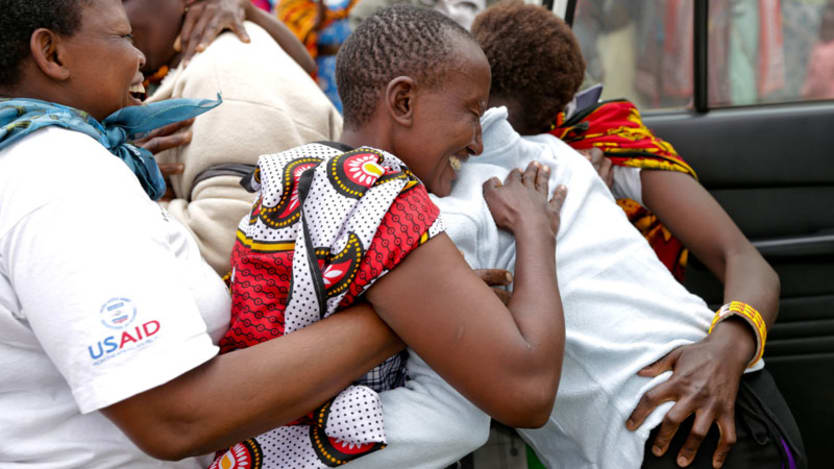Opinion: It's time for donors to embrace women's equality. Here's how.

This International Women’s Day, my hope is that we start to rethink existing patterns on how human rights funding decisions are made. There has been quite a lot of discussion in recent years on localizing aid, but in practice, direct funding is the exception rather than the rule. This gives the impression that small women’s groups cannot be trusted to “do the job properly.”
We need to change this mindset. Front-line organizations do not need to be micromanaged. They know how to use funds efficiently and are best positioned to ensure that the work they do has maximum impact.
Here are three ways to work with women’s organizations to promote equality.
1. Trust and empower experienced front-line leaders from the “global south”
We have disempowered the very people who are doing the most vital work in their environments to ensure that women and girls are free from violence and discrimination. Solutions led by those on the front lines are always going to be more impactful and more sustainable, as they are provided by trusted experts who understand local context. Initiatives that seem to be led by “outsiders” are much more likely to be resisted.
Donors should appreciate the importance of building mutual trust between their organization and those working on the front lines. A large component of this means ensuring they are part of decision-making on where funding should be spent. They should be regularly consulted as experts in their own locality. Efforts should be made to appreciate and also build their capacity as inspirational leaders in their own right. Opportunities for horizontal learning between front-line groups should also be provided to share best practice and build partnerships.
At least we are finally talking about the real needs of the global women’s movement. Things were quite different in 1992 when I co-founded Equality Now, the international women’s rights advocacy organization. For 20 years, I helped the organization grow and prosper, and played a meaningful role in the protection and promotion of women’s rights around the world.
Read related stories:
► In global development, calls for gender parity only grow louder
► Q&A: Joelle Tanguy of UN Women talks priorities, protests and funding struggles
► Opinion: Could the entertainment industry help end child marriage?
► Economically empowering women is 'macrocritical' — IMF chief Christine Lagarde
► Charlotte Petri Gornitzka on female leadership in development
Yet, as Equality Now and the international women’s movement grew steadily over the course of these two decades, the front-line groups on which we depended for research and strategic action did not grow at the same pace. Increasingly, it concerned me that funds were not getting to where they were needed most — at the local level.
I set up Donor Direct Action in 2011 to help address this imbalance. We regrant at least 90 percent of contributions to our partners for general operating support. It is my hope that international nongovernmental organizations and donors will help to bring activists to centers of power around the world — by ensuring their perspectives are included in global policy discussions, that leaders from the global south are trusted, and that the percentage of direct funding to local efforts is drastically increased.
2. Get as much direct funding as possible to changemakers who lead at local level
Human rights funding through consultancies and international NGOs with relatively less local expertise are proliferating a form of neo-colonialism, which seems to be founded on the basis that the West “knows best.” It gives the impression that a donor’s subjective preferences for what funds should be spent on — and how a project should be monitored and evaluated — is more relevant than building the strength of any local organization, and ensuring that it can use the grant in a way that it knows will have most impact.
The data we have available shows my concern is valid. According to the World Bank, investing in women is vital to end poverty and boost economic growth. The Organisation for Economic Co-operation and Development found that while $10 billion had been provided to civil society organizations working to ensure gender equality in the global south in 2014, only 8 percent of such aid had gone to groups that were based in developing countries. Yet, it is the groups on the ground that do most of the “heavy lifting” and know how to use any level of resources effectively and efficiently.
The OECD noted that most aid is being used at the international level, potentially causing local groups “to act primarily as implementing agencies rather than to pursue their own agendas.” Front-line organizations are forced to adjust the focus of their work to “fit” with often arbitrary donor objectives and rather glossy “results,” which are often designed to make the donor look good, rather than convey tangible impact on the ground.
The obvious solution is for donors to commit to giving a much higher percentage of their overall funding directly to front-line groups. In our experience, in the case of women’s rights initiatives — such as ending female genital mutilation — the majority of funding is given to expatriate consultancies or international advocacy groups. Very little actually makes it to the local level. If we are to have sustainable change, this needs to urgently change.
I have seen firsthand how women’s groups such as the Tasaru Center in Kenya, the Forum for Women, Law and Development in Nepal and the Humanitarian Assistance for the Women and Children of Afghanistan have managed to do so much life-changing work on a shoestring. I can only imagine how much more they could do if they could access the sustainable funds they need to build their own organizations over the longer term and lead initiatives in the way they know will work best.
3. Involve feminist leaders from the global south to help ensure lasting peace
The broader rationale for supporting front-line feminist activism is clear. In this turbulent global political environment, the empowerment of women in their homes and in society is increasingly seen as a solution to ensuring lasting peace. According to the International Peace Institute, when women are included in peace talks, there is a 20 percent increase in the likelihood that any agreement will last two years. However, many peace negotiations completely exclude women, or give them a “separate track” to work on. This means groups such as the Libyan Women’s Platform for Peace and almost completely ignored — even though they have so much to bring to the table.
The solution to this is to recognize that women’s equality is the foundation stone of ensuring sustainable peace. In practice, women should be meaningfully included in decision-making from the outset. Funders and international organizations should ensure that this is part of the criteria for funding peacebuilding efforts and related activities.
In all of these scenarios, real partnership means building up strategies together hand-in-hand with front-line partners. This collaborative approach reflects a true form of feminist equality and puts the power in the hands of the group to build its own capacity and prioritize work according to its own vision, rather than a donor’s preference. This means change — whether it is ensuring lasting peace or ending violence or discrimination — can take place in the most effective and sustainable way possible: from the roots up.
I hope more donors will take that leap and start trusting women leaders and locally led feminist solutions — particularly from the global south. Agreeing on a way forward on the world’s most pressing issues, which prioritizes leadership from those most affected — rather than those with the most dollars — would transform how we all see the world. This is the new frontier in feminist activism and international development, and it could be our saving grace.
Join the Devex community and access more in-depth analysis, breaking news and business advice — and a host of other services — on international development, humanitarian aid and global health.
Search for articles
Most Read
- 1
- 2
- 3
- 4
- 5








